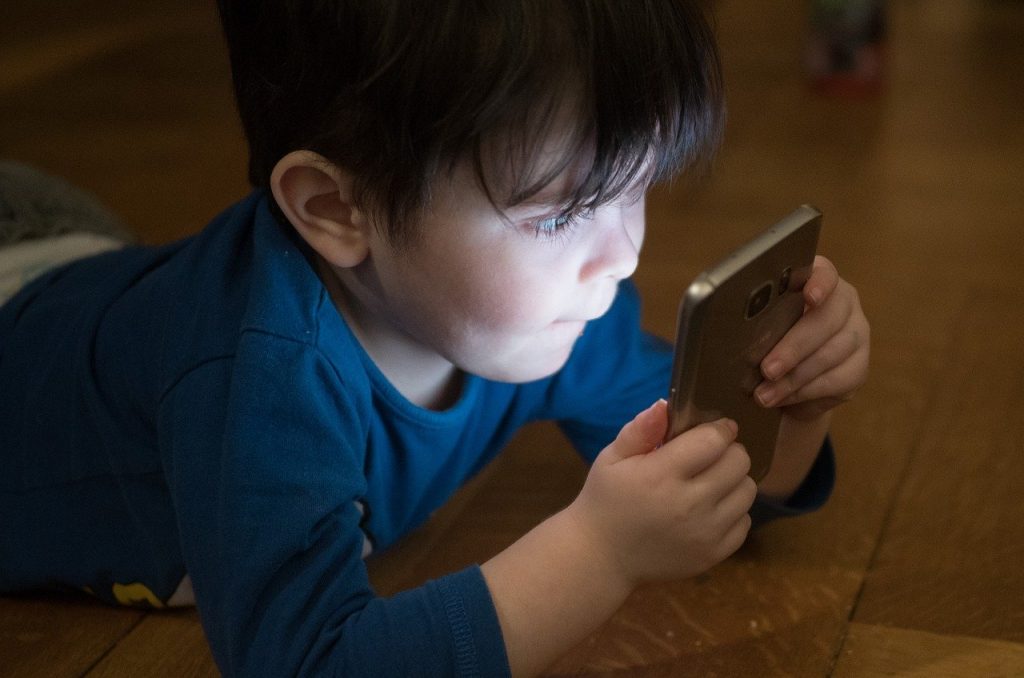Screen time and gadget disputes have become a dismal aspect of family life for many parents in the digital era, and determining how much is too much has become a changing target. It is almost impossible to keep your children away from screens, but you should help reduce screen timing as much as possible for your kids’ benefits.
Every phase of childhood and adolescence now comes up with its own set of fascinating new parenting issues, whether it is 3-years olds throwing outbursts when the i-pad is snatched away, 7-years-old staying up all night watching YouTube, 9-year-olds wanting their private device, 11-years-old pestering to play video games that “their every classmates” are playing, or 14-years-old who never leaves social media.
The American Academy of Pediatrics (AAP) still strongly advises that children under the age of six spend no more than one hour of “high-quality scripting,” After that, parents should set consistent limitations on time spent using platforms set aside screen-free quality family times.
In This Article
What is the limit of excessive consumption?
Kids below the age of 18 months should not be exposed to any screen time at all. Video conferencing with grandparents or other family members is an exception to this guideline because it is considered quality time spent communicating with each other.
Toddlers between the ages of 18 and 24 months can begin to enjoy screen time with parents and guardians. Babies between the age group of two and three should view no more than 1 hour each day. However, not all screen time is equal. Wrong screen time is when you put your kid in front of the television and watch your favorites shows with you.
Enjoying an exciting color and shape game on devices with your infant or viewing high-quality educational programs together is an example of good screen time. Please take advantage of screen time to communicate with your children and teach them about the world. Allowing your child to waste hours alone staring at a device is not a good idea.
Why should you limit the amount of time your kids spend in front of a screen?

When it comes to excessive screen time, many individuals focus on the non-physical consequences. The truth is that spending too much time in front of the screen has genuine bodily consequences.
Spending too much time in front of devices can prevent your children from engaging in other activities like connecting with family and friends, playing outside, creating, or reading. In addition, too much screen time raises your children’s chances of being:
- Vision alterations and dry eyes: Excessive screen time can lead to nearsightedness, and the blue LED lights utilized can induce eye strain.
- Distortion of sleep: Electronics’ blue light can mess with your children’s circadian clock and prevent them from getting enough sleep.
- Muscle weakness and lousy posture: A lack of physical activity can harm muscle function and coordination. Additionally, bending over a screen can promote poor posture and lead to back and neck issues.
- Obesity: A lack of physical activity can result from too much screen time. Obesity will be encouraged, as a result, as well as weight-related health concerns.
Too much screen time has very significant physical consequences. There are also crucial non-physical consequences that your kids might face if they spend too much time in front of the screen:
- Not being patient enough: In general, the screen delivers quick gratification. Even something as easy as a click or turning a page inhibits enjoyment when you have access to various touch devices. The actual world might be challenging to navigate when surrounded by so many activities that promise instant satisfaction.
- Making and retaining friends is difficult: Not unexpectedly, your ability to engage correctly with people in social circumstances is controlled by your brain. The frontal lobe gets the bulk of the burden and undergoes significant development during childhood. Too much screen time can cause your kids to lose out on this stage of development, which can have adverse effects on social skills.
- Attitude issues: Children who spend more than 2 hours each day in front of a screen are significantly more prone to engage in undesirable behaviors. Kids could also be more susceptible to bullying.
- Overstimulation of violence: Violent outbreaks have been linked to excessive screen use. Children may believe that violence is an acceptable response due to graphic and violent programs and video games.
- Poor academic results: Academic exams have shown that children who spend more time enjoying screen devices fare worse. When at all feasible, try to stick to the prescribed devices time for children.
Screen time does not have to be a binary choice. By limiting screen time, your children could enjoy the benefits of technology while avoiding the negatives.
10 Ways to find a healthy balance in Children’s screen time:

Parents usually have complaints regarding their children about more usage of devices. It is also a topic of concern because mobile screens are not suitable for children as they may damage eyes, brains, and posture and make a child dull and inactive.
To keep your children away from a mobile phone might be impossible, but there are some ways to create a balance in screen timing. Devices are not barriers if they are used appropriately and safely. Here are few tips for finding a healthy balance in device usage in children:
1. Provide more activities:
The first one is self-evident. Provide your children with age-specific games and toys so that they may spend their time playing, exploring, and learning. Yes, it is more challenging to get through arts and crafts than to slip in a DVD or pen drive, and it is messier, but giving activities allows your child to grow and develop.
First of all, try to know your kids’ hobbies and interests. Then, provide them the materials to engage them in it and become busy. You can also offer them indoor activities such as chess, ludo, other board games, and toys such as toy cars, airplanes, and other entertaining kinds of stuff.
Outdoor games such as football, basketball, swimming, cycling, skating, and more also help your children become occupied and busy. To make the activities more exciting and fun, try to get yourself engaged in them too. Children would be more satisfied and get appreciated if parents play with them.
2. Set aside specific screen time:
Delegating times as “screen time” encourages children to self-regulate and establishes strict boundaries, whether it is half an hour before lunch or an hour after school. Setting a screen limitation is a must because if you let your children use mobile all the time, there is no escape for your children.
Make a rule of not using mobile during lunch or family times, study time, 1 hour before bedtime, and so on. Also, let them use mobile-only when necessary. You can also set a mobile usage time like after completing homework and also add a time so that your children keep on using mobile without stopping.
By applying strict rules, your kids may get irritated or show tantrums, so let them use their mobile on Sundays and other holidays for extra time than other days. At first, it may seem impossible but never give up and let your children follow the rules; this will become a habit one day.
3. Make the most of your time:
You can be proactive and keep your children occupied if you plan your day and manage your time correctly. When you concentrate on your chores and work carefully on them, you will be better able to respond to your children and devote your time, effort, and energy to activities other than watching television.
It would be best if you set aside time for your kids each day. You can spend time with your children as much as possible. If not, at least give 1 hour of your time for your kids. After all, nothing is more important than your children, and all the hard work you are doing is only for them. So, why not give them a few seconds from your busy schedule?
Provide enough time and attention to your children so that your children would not feel leftover.
Children always want to be around their parents and remain under their shadow, which might not be entirely possible if you are working parents, but you could manage the space by spending time with them when possible.
4. Use parental control software:
Due to the help of parental control apps, you could easily monitor your kids’ devices. It would be easier to block inappropriate content, manage social media (phone contacts and messages), and set a screen limitation. Some of the best parental control apps are fenced.ai, kidsLogger, Qustodio, and more.
Your kids will use the device, but they would only see and use it as per your wish and guidance. Your teens may have a problem with such apps, but you can convince them by adding the advantages of such apps. If your children are more addicted to the screen, you could slowly vanish their habit, and they would understand the amount of screen time is necessary and get used to it.
Sometimes your children or teens knowingly or unknowingly get in trouble because of social media, and you would be unaware of the facts, but with the help of monitoring apps, your children could experience safe internet surfing, mobile usage, along with screen time limitations.
5. Set a good example:
As per the saying, “Parents are the children’s first teacher, and home is their first school,” it clearly shows how the actions and activities of parents impact the children. Kids always follow your footprints, so be very careful before stepping on anything. Choose your path towards positivity and the right ones.
It is at this point that the rubber meets the road. The screen immerses us as adults, and the majority of the devices we are attempting to keep our children away from are our own. We cannot expect our children to be any different if we are always in front of a screen.
The vital way to set an example is not to bring your office work home. Try to complete your task at your workplace if possible. If not, let your children know that you face the screen because of your work, not willingly but because of responsibility and duties. Teach your children good understanding skills too.
6. Reward your children with screen time:
Consider screen time as a reward for older children rather than a privilege. Allow the children to earn it by engaging in outside and active play, doing school works and chores, or engaging in other positive actions. Only provide mobiles to your children if they are behaving well and done a wise job.
For instance, if your children completed studying and with homework, managed their rooms and bookcases, ate adequately and behaved nicely, provide them with a mobile for some time as a reward. By doing so, your children will also learn to do their work themselves, and you can teach them good manners too.
The idea of providing rewards also develops a healthy environment at home because both of you will be satisfied fully. You will get well-behaved and responsible children as a reward in return. Your children will also know the value of reward and understand the responsibility at the same time.
7. Place the television in the hidden location:
While there are valid justifications for having the television in the main living room, you know what your children are watching, it is preferable to keep it hidden, such as in the closet. Children are less likely to go there by accident if they do not see it.
Your children might see television outside the house and question you; you can explain those disadvantages of screens better. Do not scare your child, but explain how they affect their vision, productive time, and their study too.
Do not even mention television in front of your children. Make your children realize that such screen devices are not essential and necessary in their lives. You can easily survive without them. There are far better things to do in life than spending time on television (i.e., idiot box).
8. Put in the effort required to be a good parent:
It is all too tantalizing to rely on technology to keep children occupied, whether at the supermarket or in worship. On the other hand, increased availability of amusement deprives children of the opportunity to acquire patience, constructive dialogue, and self-entertainment.
The responsibility of parents is to show a good path; teach self-motivation, discipline, and good moral character to their children, which is only possible if parents start giving time to their children rather than putting the devices in their hands. Parents should understand that parenting is a task that needs more patience.
No one is perfect; even parents are also normal human beings. It would be unfair if we start forcing parents to be perfect. But with more patience, self-motivation, and a bit of hard work, parents will succeed in making their children self-dependent, self-entertained, and satisfied.
9. Encourage self-directed play:
Parents turn to technology to keep their children occupied because they want to get some work done. Instead, encourage children to play alone. Nesting bowls may be appropriate for younger children, while a project or outdoor play may be appropriate for older children.
Independent play is beneficial to children’s development and allows parents to do a task for a few minutes. Self-playing also helps make children independent, disciplined, enhances leadership quality, and could be a good decision-maker in the future.
Parents could also teach children some self-games in entertaining ways to not feel the requirement of screen devices. Encourage involvement in arts and crafts, writing, studying books, gymnastics, yoga, or exercise. The more your children are involved in self-activities, the less they seek screen devices.
10. Make screen time more engaging:
Parents may use screen time to develop significant connections with their kids, whether through a family movie night or playing video games on screen devices. You can reserve a few times for such activities either once a week or twice a week depending on your mindset.
Using more devices creates not only disputes, misunderstanding, and irritation but also hampers the parent-child relationship. If screen timing is appropriately managed, this will develop a healthy and robust bonding among parents and children.
Children also get excited and understand the value of family time when screen time is made engaging. You can show them movies such as autobiography, history, sci-fi and other information-gaining movies also make sure your children enjoy them. Also, play video games with clean content, not the ones containing violent and inappropriate content.

Conclusion:
The one undisputed fact is that children are now exposed to screens all the time. To make a sensible parental decision, you should know your ultimate goal for children’s screen time. Good decisions could help your kids attain the success you believe they deserve. Always make the best and wise choice for your children. Only parents know what is best for their children.










![Home Renovation Guide [2025]](/app/uploads/2021/04/design-hacks-1-378x300.jpg)
